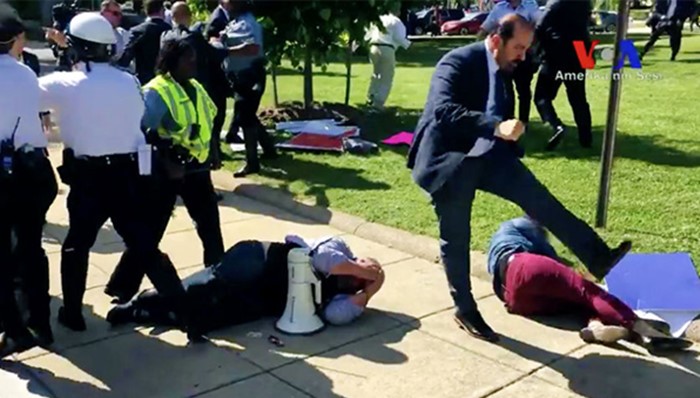The Washington Post in an editorial on Sunday said that bodyguards of the Turkish president who were indicted by US prosecutors for an attack on peaceful protestors outside the residence of the Turkish ambassador last year still deserve to be brought to justice whether their leader likes it or not.
On May 16, 2017 members of President Recep Tayyip Erdoğan’s security detail engaged in a violent brawl with a group of protesters outside the residence of the Turkish ambassador in Washington while Erdoğan was paying an official visit to the country. At least 11 protesters were injured.
Arrest warrants were issued in June for 16 people including 12 members of Erdoğan’s security detail for the attack.
In August, 19 people, including 15 of Erdoğan’s guards, were indicted for attacking people who were protesting the visit of Erdoğan and for committing a violent crime. Some of them also face charges of assault with a deadly weapon.
The first reduction in the scale of the case came in November, when prosecutors called for the dismissal of charges against four members of the Turkish security team. Then charges were quietly dropped against seven more security detail members, including the head of the team, on Feb. 14, a day before then-Secretary of State Rex Tillerson traveled to Ankara for an official visit.
US officials insist the prosecutors were not pressured to drop the charges for political reasons and that the decisions were motivated by the misidentification of four of the subjects and the lack of sufficient evidence against the others.
“If their cases were to be dropped for diplomatic reasons, the Trump administration at least should have demanded concessions in return — starting with the immediate release of Christian missionary Andrew Brunson and other Americans suffering in Turkish jails. Mr. Erdogan himself has described the Americans he is holding as bargaining chips; he would like to use them to obtain the arrest and extradition of a Turkish political enemy living in Pennsylvania,” said the Post editorial, titled “Erdogan’s thugs still need to be brought to justice,” adding, “Even if the bodyguards’ cases were dismissed on the merits, there are troubling questions about the government’s handling of the unprovoked attack on people protesting Mr. Erdogan’s regime during his visit here last May.”
Video footage of the altercation shows demonstrators protesting the policies of President Erdoğan, who was visiting Washington for a White House meeting with Donald Trump, countered by agitated supporters of the Turkish head of state and subsequently attacked by the Turkish president’s bodyguards. Another video clip showed Erdoğan apparently giving the order for his security detail to attack the protesters and watching it unfold outside the ambassador’s residence on Sheridan Circle.
Charges remain against four guards, although the possibility that they will be arrested and brought to trial is remote, said The Post.
“Still, if the U.S. justice system rigorously and fairly evaluated the cases against Mr. Erdogan’s musclemen and determined they could not all be fairly prosecuted, then perhaps that could serve as a useful model for the Turkish leader. A number of innocent U.S. citizens, and many thousands of innocent Turkish journalists and other political prisoners, would be the beneficiaries,” it concluded.
Turkey has suspended or dismissed more than 150,000 judges, teachers, police and other civil servants since a failed coup on July 15, 2016, which the government blames on the faith-based Gülen movement. Turkey’s interior minister announced on December 12, 2017 that 55,665 people have been arrested. On December 13, the Justice Ministry announced that 169,013 people have been the subject of legal proceedings on coup charges since the failed coup.
American pastor Andrew Brunson ran a small church in Turkey for 23 years before being arrested on alleged immigration violations and indicted on charges of perpetrating crimes in the name of the Gülen movement and the outlawed Kurdistan Workers’ Party (PKK) and for obtaining state secrets for political or military espionage.
He faces 35 years in prison if convicted.

